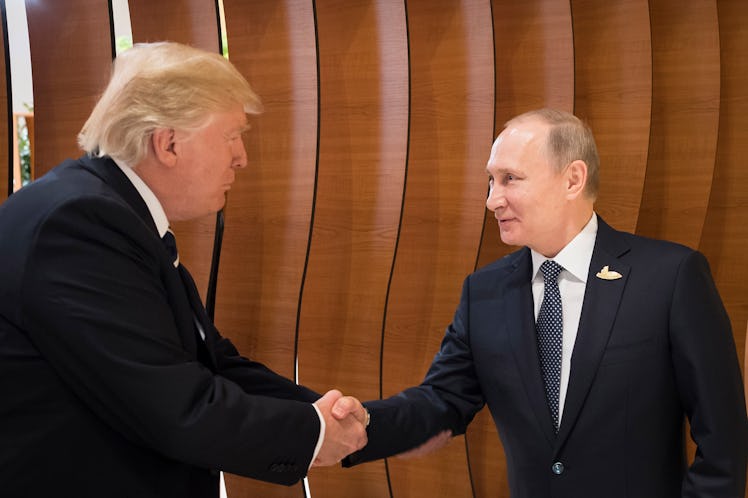
Trump Says Putin Didn't Interfere With The Presidential Election &, Um, You Sure?
Donald Trump really doesn't think that Vladimir Putin had anything to do with with the 2016 presidential election. Or, at least, he said he's done "insulting" the president by asking. Despite plenty of evidence to the contrary, Trump is positive there wasn't Russian election interference, and all I can say is huh?
On Nov. 11, our president arrived at the Asia-Pacific Economic Cooperation summit in Vietnam, and spoke to Putin several times informally, according to CNN. As Trump was boarding Air Force One that same day, he told reporters that he had spoken to Putin about the election meddling allegations.
"He said he didn't meddle. He said he didn't meddle. I asked him again. You can only ask so many times," Trump said. "Every time he sees me, he says, 'I didn't do that. And I believe, I really believe, that when he tells me that, he means it."
The president added, "I think he is very insulted by it"
It's a little bit of murky territory as to whether or not Putin and Trump actually did have a thorough, serious discussion about the 2016 election during this recent trip... or any discussion at all, for that matter.
When CNN reached out to Putin's press secretary Dmitri Peskov over text and asked if the two men broached the subject of meddling, Peskov responded with a definitive "no."
There is definitely probable evidence that Russia interfered with the election.
A report released by U.S. intelligence officials on Jan. 6 confirmed that Putin had backed a Russian-led campaign to “denigrate Secretary Clinton, and harm her electability and potential presidency.” The report also noted that Putin had “a clear preference for President-elect Trump.”
Once more, during a Senate Intelligence Committee meeting in May, every single intelligence official agreed that “Russian intelligence agencies were responsible for the hacking and leaking of information and using misinformation to influence our elections."
Some of that misinformation stemmed from Facebook. According to the social media platform, Russian-backed content reached about 126 million Americans both during and after the presidential election. One hundred and twenty fake pages were created, and those pages spun out 80,000 posts. Colin Stretch, the general counsel for Facebook, noted that the Russian-backed posts zeroed in on gay and transgender issues, race, religion, and gun rights.
"I think there's much more than 350-odd accounts that were involved in this process," Sen. Mark Warner (D-Virginia), a member of the Senate Intelligence Committee, told CBS News. "I think it was much more than the simply one internet troll farm they found in St. Petersburg ... Moldova, for example, there were lots of indications that there were internet trolls working throughout the election out of that country and other countries in Eastern Europe."
And then, of course, there was the hacking of the Democratic National Convention emails, Donald Trump Jr.'s shady meeting with a "Russian government lawyer," and several allegations that connect Trump's campaign advisors with Russian individuals and entities.
Meanwhile, Trump continues to deny any and all meddling.
"There was no collusion. Everybody knows there was no collusion," Trump said on Nov. 11. "I think it's a shame that something like that could destroy a very important potential relationship between two countries that are really important countries."
This is the same man who, during the 2016 election, suggested that Russia hack into Hillary Clinton's emails.
“Russia, if you’re listening, I hope you’re able to find the 30,000 emails that are missing," he quipped. "I think that you will probably be rewarded mightily by our press—let’s see if that happens, that’ll be nice.”
Hmmm. Is it just me or does everything Trump say about Russia seem like a load of (excuse the expression) fake news?